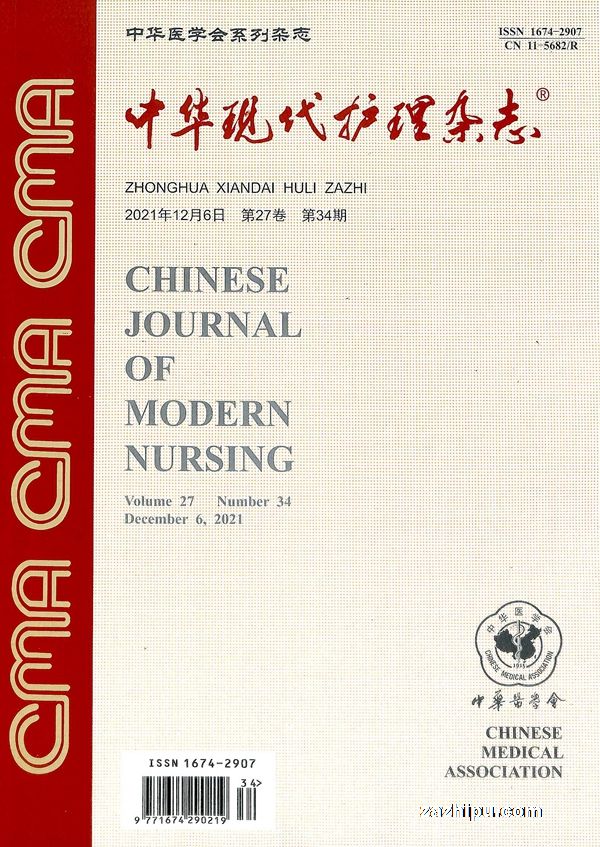Current situation and influencing factors of compassion fatigue in ICU nurses
引用次数: 0
Abstract
Objective To investigate current situation of compassion fatigue of ICU nurses and to analyze its influencing factors. Methods By convenient sampling, a self-designed general information questionnaire, Chinese version of the Compassion Fatigue Short Scale (C-CFSS) , Ego-Resilience Scale (ERS) and Perceived Social Support Scale (PSSS) were used to investigate 194 ICU nurses in a ClassⅢ Grade A hospital in Yantai from May 2019 to June 2019. The t-test, one-way ANOVA, Pearson correlation analysis and multiple linear regression were used for statistical analysis. Results The total C-CFSS score of ICU nurses is (58.85±36.2) . ICU nurses had a moderate compassion fatigue level. The ICU nurse's ERS score was (39.96±7.65) , the PSSS score was (61.15±14.65) . The univariate analysis showed that there were statistically significant differences in C-CFSS scores among nurses of different ages, department beds, final education, self-perceived health status, monthly income, parenting (P<0.05) ; Correlation analysis showed that ICU nurse ERS score was negatively correlated with C-CFSS score (r=-0.200, P<0.01) ; PSSS score was negatively correlated with C-CFSS score (r=-0.278, P<0.01) . The results of multivariate analysis showed that age, the number of beds in the department, final education, self-perceived health status, and understanding of social support were the main influencing factors of compassion fatigue among ICU nurses, which together explained 30.1% of the total variation of compassion fatigue (F=9.673, P<0.01) . Conclusions The overall degree of compassion fatigue of ICU nurses is moderate. As nursing managers, they should pay attention to ICU nurses with different characteristics such as age, educational background and health status, carry out lectures and training on compassion fatigue, increase the social support of ICU nurses and formulate corresponding preventive intervention measures, so as to reduce the occurrence of compassion fatigue. Key words: Intensive care unit; Nurses; Compassion fatigue; Ego-resilience; Social supportICU护士同情疲劳的现状及影响因素
目的了解ICU护士同情疲劳的现状,分析其影响因素。方法采用自行设计的一般信息量表、中文版同情疲劳短量表(C-CFSS)、自我弹性量表(ERS)和感知社会支持量表(PSSS),采用方便抽样的方法,对烟台市某三甲医院2019年5月至2019年6月的194名ICU护士进行调查。采用t检验、单因素方差分析、Pearson相关分析和多元线性回归进行统计分析。结果ICU护士C-CFSS总分为(58.85±36.2)分,具有中度同情疲劳水平。ICU护士的ERS评分为(39.96±7.65),PSSS评分为(61.15±14.65)。单因素分析显示,不同年龄、不同科室床位、不同学历、不同自我感知健康状况、不同月收入、不同育儿方式的护士的C-CFSS分别差异有统计学意义(P<0.05);相关分析显示,ICU护士ERS评分与C-CFSS评分呈负相关(r=-0.200,P<0.01);PSSS评分与C-CFSS评分呈负相关(r=-0.278,P<0.01)。多变量分析结果表明,年龄、科室床位、最终教育程度、自我感知健康状况和对社会支持的理解是ICU护士同情疲劳的主要影响因素,解释了30.1%的同情疲劳总变异(F=9.673,P<0.01)。作为护理管理者,应关注具有年龄、学历、健康状况等不同特征的ICU护士,开展同情疲劳的讲座和培训,增加ICU护士的社会支持,制定相应的预防干预措施,以减少同情疲劳的发生。关键词:重症监护室;护士;同情疲劳;自我恢复力;社会支持
本文章由计算机程序翻译,如有差异,请以英文原文为准。
求助全文
约1分钟内获得全文
求助全文

 求助内容:
求助内容: 应助结果提醒方式:
应助结果提醒方式:


